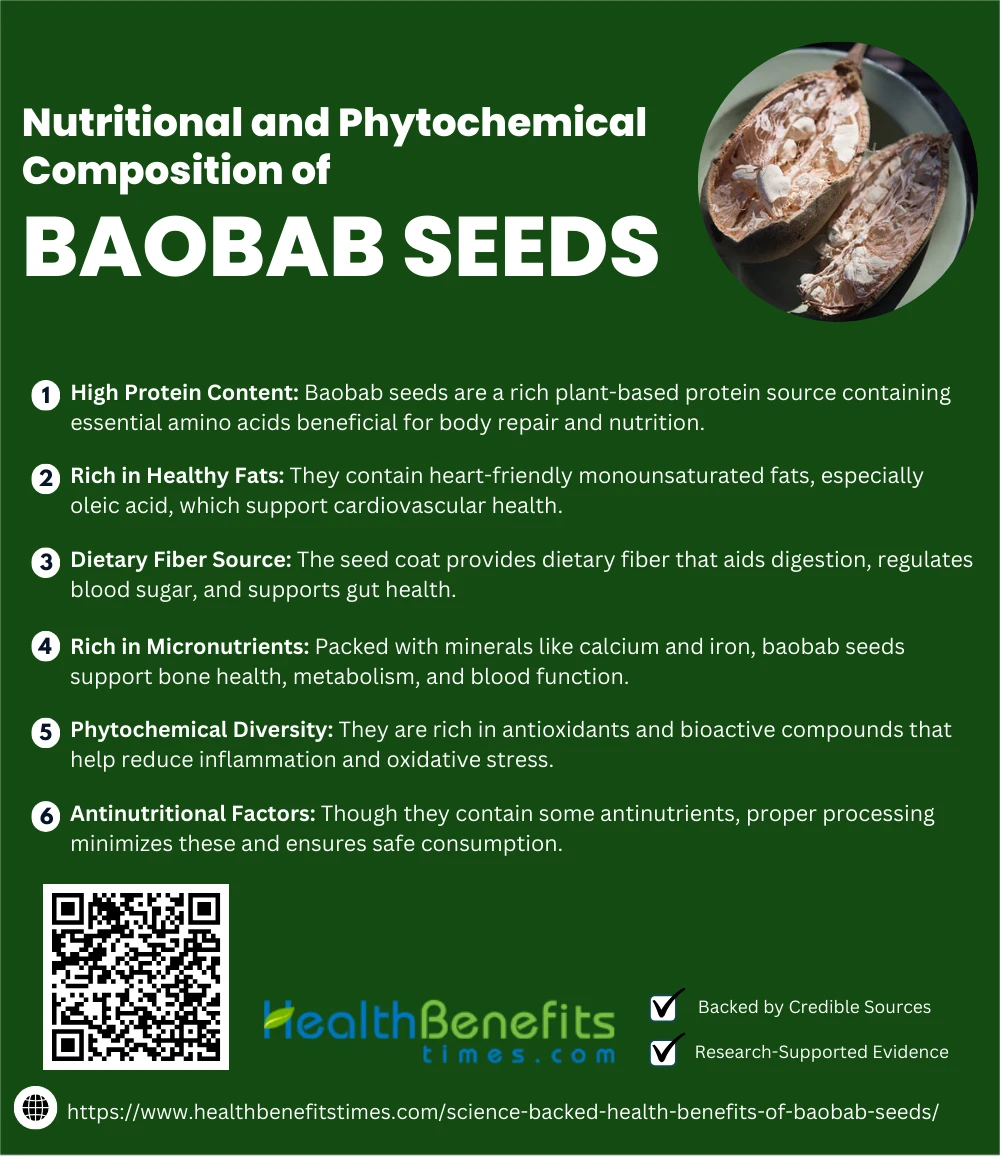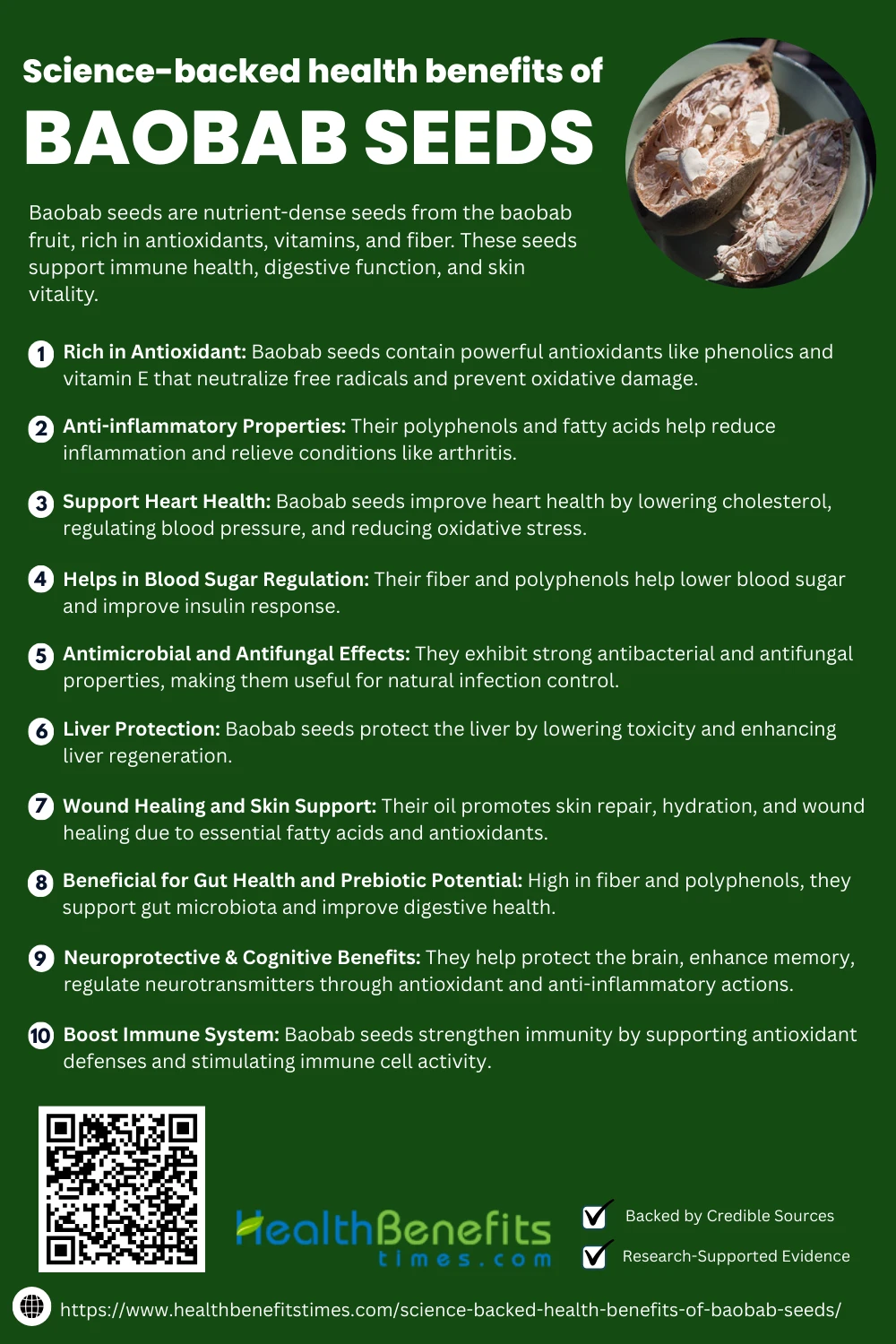- Baobab seeds are nutrient-dense seeds from the baobab fruit, rich in antioxidants, vitamins, and fiber.
- These seeds support immune health, digestive function, and skin vitality.
- Scientific studies show their potential to manage blood sugar levels and reduce inflammation, making them a powerful dietary addition.
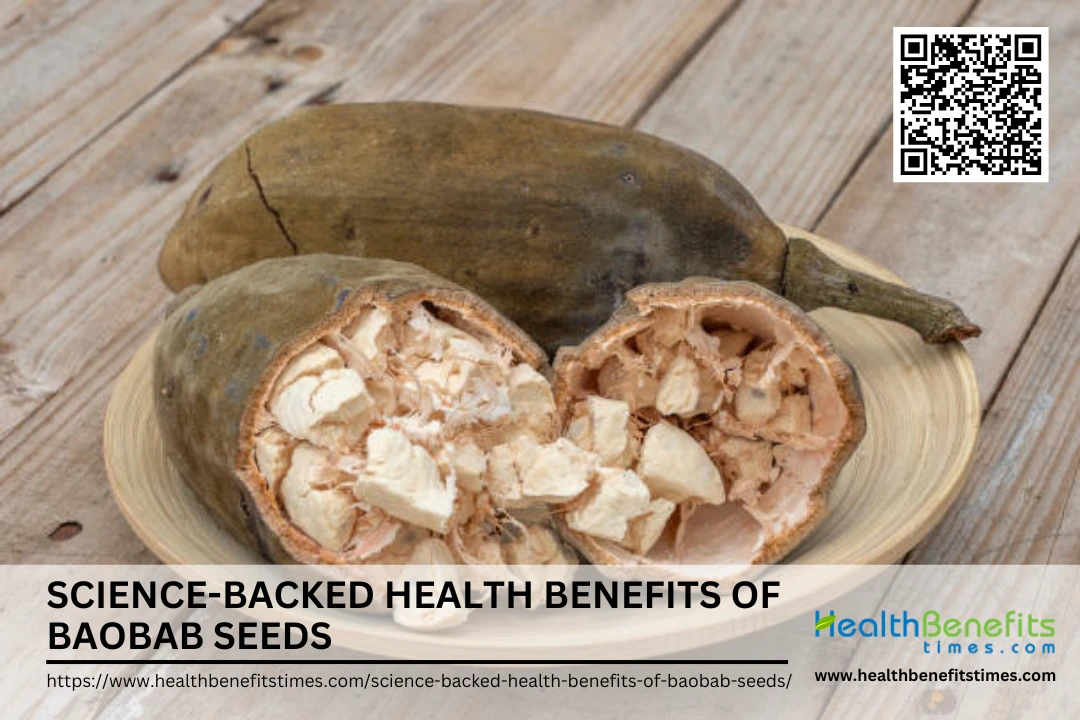 Baobab seeds are the nutrient-rich, oil-bearing seeds of the Adansonia tree, indigenous to parts of Africa and known for their traditional and emerging uses in nutrition and medicine. These seeds are valued for their high content of essential fatty acids, fiber, and bioactive compounds. As scientific interest in superfoods rises, baobab seeds have gained attention for their remarkable health benefits backed by biochemical and nutritional research. Rich in polyphenols, phytosterols, and micronutrients like calcium and magnesium, baobab seeds exhibit potent antioxidant and anti-inflammatory effects that may support cardiovascular and metabolic health. Research highlights that the seeds also have antimicrobial and potential prebiotic properties, offering holistic wellness advantages. Moreover, their oil contains bioactive lipids that contribute to the regulation of oxidative stress and inflammation—key pathways implicated in chronic disease prevention.
Baobab seeds are the nutrient-rich, oil-bearing seeds of the Adansonia tree, indigenous to parts of Africa and known for their traditional and emerging uses in nutrition and medicine. These seeds are valued for their high content of essential fatty acids, fiber, and bioactive compounds. As scientific interest in superfoods rises, baobab seeds have gained attention for their remarkable health benefits backed by biochemical and nutritional research. Rich in polyphenols, phytosterols, and micronutrients like calcium and magnesium, baobab seeds exhibit potent antioxidant and anti-inflammatory effects that may support cardiovascular and metabolic health. Research highlights that the seeds also have antimicrobial and potential prebiotic properties, offering holistic wellness advantages. Moreover, their oil contains bioactive lipids that contribute to the regulation of oxidative stress and inflammation—key pathways implicated in chronic disease prevention.
Nutritional and Phytochemical Composition of Baobab Seeds
Baobab seeds are packed with essential nutrients and bioactive compounds, including healthy fats, proteins, fiber, minerals, and antioxidants, making them a valuable addition to functional and therapeutic food applications.
Baobab seeds are an excellent plant-based source of protein, with concentrations ranging from 20% to 30% depending on origin and processing. The protein quality includes essential amino acids such as lysine, leucine, and valine, making baobab seeds suitable for enhancing dietary protein intake, especially in regions where animal protein is scarce. This protein richness also supports cellular repair and enzymatic functions.
2. Rich in Healthy Fats
Baobab seeds contain up to 39% oil, primarily made of monounsaturated fatty acids. Oleic acid is the most dominant, followed by linoleic acid and palmitic acid. These lipids contribute to cardiovascular health by improving lipid profiles and lowering LDL cholesterol levels. The unsaturated fatty acid profile is similar to that of olive oil, making it beneficial in preventing atherosclerosis and inflammation.
3. Dietary Fiber Source
While the pulp is more commonly cited for fiber, the seed coat also contains dietary fiber, especially when milled into flour. This fiber aids in digestive health, promotes bowel regularity, and helps regulate blood sugar absorption, making it supportive in managing type 2 diabetes and obesity. It also contributes to satiety and gut microbiota modulation.
4. Rich in Micronutrients
Baobab seeds are a good source of minerals such as calcium, magnesium, phosphorus, potassium, and iron. These minerals play a role in bone development, energy metabolism, and red blood cell formation. The calcium and phosphorus combination is especially valuable in maintaining skeletal strength in populations with limited dairy access.
5. Phytochemical Diversity
Baobab seeds contain bioactive phytochemicals including sterols (e.g., β-sitosterol), phenolic compounds, tocopherols (Vitamin E), and tannins. These phytochemicals act as antioxidants, neutralizing free radicals and protecting cells from oxidative damage. They may also offer anti-inflammatory and antimicrobial activity, explaining their use in traditional medicine.
6. Antinutritional Factors
Baobab seeds also contain naturally occurring antinutrients such as phytates, oxalates, and tannins. While these can reduce mineral bioavailability, they are significantly reduced through processing methods like roasting or fermentation. Understanding this balance is key for safe and effective use of baobab seeds in food systems.
Comparison with other seed superfoods
Here is a detailed comparison table of Baobab seeds with several popular superfood seeds, based on their nutritional composition, health benefits, and common uses. The selected seeds for comparison include Chia, Flax, Hemp, Pumpkin, and Sunflower.
| Feature / Nutrient | Baobab Seeds | Chia Seeds | Flax Seeds | Hemp Seeds | Pumpkin Seeds | Sunflower Seeds |
| Protein (g/100g) | ~30g | 16.5g | 18g | 31g | 19g | 21g |
| Fat (g/100g) | ~30–35g (rich in linoleic acid) | 30.7g (high in omega-3 ALA) | 42g (high in omega-3 ALA) | 49g (rich in omega-6 & omega-3) | 49g (mainly unsaturated fats) | 51g (high in vitamin E–rich fats) |
| Fiber (g/100g) | Moderate (~12g) | 34.4g (very high) | 27g | 4g | 6g | 8.6g |
| Omega-3 content | Low | Very high (ALA) | Very high (ALA) | Moderate (ALA, SDA) | Low | Very low |
| Calcium (mg/100g) | High (~300 mg) | 631mg | 255mg | 70mg | 46mg | 78mg |
| Iron (mg/100g) | High (~9 mg) | 7.7mg | 5.7mg | 7.95mg | 8.8mg | 5.3mg |
| Magnesium (mg/100g) | ~200 mg | 335mg | 392mg | 700mg | 592mg | 325mg |
| Antioxidants | High (polyphenols, tocopherols) | Moderate | High (lignans) | Moderate | Moderate | High (vitamin E, phenolic acids) |
| Unique Nutrients | Gallic acid, linoleic acid | ALA, soluble mucilage | Lignans (SDG), ALA | Edestin (easily digestible protein) | Phytosterols, tryptophan | Selenium, vitamin E |
| Health Benefits | Anti-inflammatory, antioxidant | Heart health, digestive health | Hormonal balance, heart health | Muscle growth, skin health | Prostate health, immunity | Heart health, skin, mood balance |
| Culinary Uses | Oil extraction, traditional foods | Smoothies, puddings, baking | Smoothies, oatmeal, baking | Salads, protein shakes | Roasted snacks, salads | Trail mixes, butter, baking |
| Gluten-Free? | Yes | Yes | Yes | Yes | Yes | Yes |
| Allergenic Potential | Low (but under-researched) | Very low | Very low | Low (rare) | Moderate (may cause allergies) | Moderate (allergy risk exists) |
| Shelf Life (Dry) | Long (if kept cool and dry) | Long (cool & dry storage) | Shorter (prone to oxidation) | Moderate (store in cool, dark places) | Long (in-shell); shorter shelled | Long (store in airtight container) |
Key Science-Backed Health Benefits of Baobab Seeds
Baobab seeds are a powerhouse of nutrients, offering a wide range of health benefits. Rich in antioxidants, vitamins, and fiber, they support immune function, digestive health, and overall well-being.
Baobab seeds are a potent source of antioxidants, particularly phenolics and vitamin E derivatives. Research confirms their high free radical scavenging activity due to compounds like gallic acid and linoleic acid Abubakaretal.,2015Abubakar et al., 2015Abubakaretal.,2015. (1) The oil extracted from baobab seeds exhibits robust antioxidant properties El−Arab,2017El-Arab, 2017El−Arab,2017. Ultrasound-assisted methods enhance polyphenol yield Ismailetal.,2019Ismail et al., 2019Ismailetal.,2019, while other studies highlight nutritional synergy in pulp-oil blends Donkoretal.,2014Donkor et al., 2014Donkoretal.,2014 and seed-based antioxidant applications in food preservation Al−Juhaimietal.,2020Al-Juhaimi et al., 2020Al−Juhaimietal.,2020. (2) (3) (4)
2. Anti-inflammatory Properties
Baobab seeds are increasingly recognized for their potent anti-inflammatory effects due to bioactive constituents such as polyphenols and fatty acids. Studies have confirmed their ability to inhibit pro-inflammatory enzymes and cytokines, offering relief in conditions like arthritis and tissue swelling Zahra’u et al., 2014. (5) Ethanolic extracts showed strong activity in reducing inflammation in animal models Thiyagarajan et al., 2015. Further, comparative reviews highlighted analgesic and anti-inflammatory outcomes in oral applications. Microwave extraction enhanced anti-inflammatory potency, and recent in vivo findings support its medicinal value Thompson et al., 2024. (6)
3. Support Heart Health
Baobab seeds are emerging as a potent natural remedy for cardiovascular protection due to their rich antioxidant and polyphenolic composition. Research confirms their ability to reduce lipid peroxidation and cardiac inflammation in animal models. (7) They regulate blood pressure and oxidative stress pathways, enhance lipid profiles, and counteract cardiotoxic damage. (8) Their bioactive compounds modulate cholesterol and heart enzymes efficiently. (9)
4. Helps in Blood Sugar Regulation
Baobab seeds demonstrate notable blood sugar-lowering properties due to their rich fiber, polyphenols, and slow-digesting carbohydrate profile. A randomized controlled trial found baobab extracts reduced postprandial glycemia in healthy adults. Similar findings were observed in diabetic rats, showing improved glucose metabolism and insulin modulation. Reviews affirm baobab’s hypoglycemic benefits Malabadi et al., 2021. (10) Seed studies also indicate glycemic benefits post-processing Alabi et al., 2021, further supported by recent evidence from SCIRP, 2021. (11) (12)
5. Antimicrobial and Antifungal Effects
Baobab seeds exhibit strong antimicrobial and antifungal properties, making them valuable for natural therapies. Methanolic extracts inhibit the growth of pathogenic fungi such as Aspergillus flavus and A. parasiticus. (13) They also demonstrate potent antibacterial activity against E. coli and S. aureus. (14) Ethanol-based extracts further confirm antimicrobial efficacy. (15) Moreover, they reduce aflatoxin production in food storage environments and combat Fusarium species effectively. (16) (17)
6. Liver Protection
Baobab seeds exhibit hepatoprotective potential due to their antioxidant and anti-inflammatory compounds. In Scientific African, researchers showed that baobab seed extracts reduced liver toxicity markers in experimental models. (18) Their polyphenolic content supports liver enzyme regulation. (19) Baobab also enhances liver tissue regeneration and inhibits lipid peroxidation. Traditional pharmacopoeia further validates these protective effects.
7. Wound Healing and Skin Support
Baobab seed oil is rich in essential fatty acids and sterols that promote skin repair and hydration. (20) Studies confirm its efficacy in treating dry, damaged skin and supporting wound healing processes. (21) Its natural antioxidants enhance tissue regeneration (El-Arab, 2017). Baobab’s anti-inflammatory properties are also beneficial in dermatological care. (22) Lastly, traditional medicine corroborates its skin-supportive applications. (23)
8. Beneficial for Gut Health and Prebiotic Potential
Baobab seeds possess prebiotic properties that significantly enhance gut health by promoting the growth of beneficial gut microbiota such as bifidobacteria and lactobacilli. Research confirms their high fiber content aids fermentation in the colon, increasing short-chain fatty acids vital for colon health. (24) Additionally, polyphenols in baobab support microbial diversity, while tannins improve gut permeability. (25) (26) These mechanisms make baobab seeds a compelling functional ingredient for digestive wellness and microbiome modulation. (27)
9. Neuroprotective and Cognitive Benefits
Baobab seed extracts exhibit neuroprotective and cognitive-enhancing properties through antioxidant, anti-inflammatory, and neurotransmitter-regulating effects. Studies in rodents demonstrated improved memory and hippocampal protection following lead-induced neurotoxicity (Otong et al., 2021). Another study reported baobab’s ability to reduce oxidative stress and enhance neurotransmitter balance in epileptic models. (24) Its efficacy is further supported by improved cerebral blood flow and cognitive scores in human trials. (28) Furthermore, baobab was shown to mitigate hippocampal damage in toxicological contexts and counter EMF-induced memory deficits. (29) (30)
10. Boost Immune System
Baobab seeds are rich in essential nutrients and bioactive compounds that significantly bolster the immune system. Their high polyphenol and vitamin C content enhances antioxidant defense and promotes cytokine production, key to immune function. (6) Studies show baobab seed extracts stimulate immune response pathways and enhance macrophage activity. (31) ({% trusted %}) They also influence gut microbiota, further supporting immunity. (32) Additionally, fermented baobab improves immunomodulation. (33)
Traditional and Emerging Uses of Baobab Seeds
Baobab seeds have long played a role in African ethnobotany. Traditionally, they are roasted and consumed as snacks or pressed for oil used in cooking and skin care. Medicinally, baobab seed extracts are used for treating dysentery, inflammation, and microbial infections. (34) Recently, scientific research highlights emerging roles of baobab seeds in functional food formulations, cosmeceuticals, and cardiovascular health. (35) Their fermentation properties also support probiotic applications in modern nutrition. (36) The COVID-19 pandemic renewed interest in baobab’s immune-supportive and antiviral properties. (37)
How to Use Baobab Seeds Safely
Baobab seeds offer numerous health benefits, but it’s important to use them safely. Proper preparation and dosage are key to maximizing their nutritional value while avoiding potential side effects.
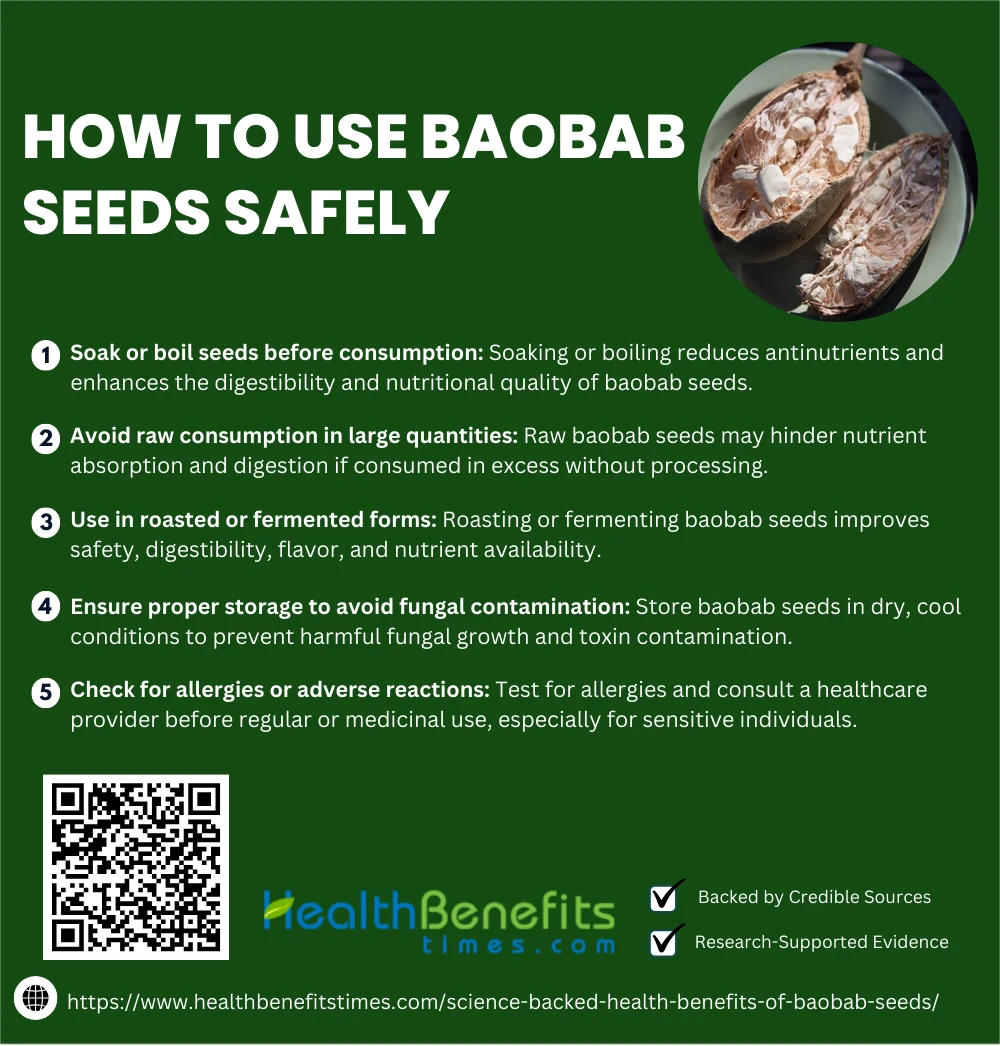 1. Soak or boil seeds before consumption
1. Soak or boil seeds before consumption
Soaking or boiling baobab seeds significantly reduces antinutritional compounds like phytates and oxalates, improving mineral bioavailability and digestion. (11) This method also enhances protein quality and softens the seed matrix for culinary use. (38) Traditional preparation techniques such as boiling remain critical for safe dietary inclusion. (39)
2. Avoid raw consumption in large quantities
Raw baobab seeds should be consumed cautiously due to their antinutritional factors like phytates and tannins, which may impair mineral absorption and digestion. (11) Excessive intake without processing can reduce protein bioavailability. (40) Experts recommend processing measures before regular consumption. (36)
3. Use in roasted or fermented forms
Roasting and fermentation are traditional methods that neutralize antinutritional elements and enhance digestibility in baobab seeds. (41) These processes also boost bioactive compounds, making nutrients more bioavailable. Fermentation, in particular, improves flavor, shelf-life, and microbial safety.
4. Ensure proper storage to avoid fungal contamination
Baobab seeds must be stored in cool, dry conditions to prevent fungal growth and aflatoxin contamination, which compromises food safety. (42) Inadequate storage fosters the growth of Aspergillus species. (13) Implementing HACCP protocols further ensures microbial safety during processing and storage. (43)
5. Check for allergies or adverse reactions
Before regular consumption, it is important to test baobab seeds for allergic or gastrointestinal responses, especially in children and sensitive individuals. Case studies suggest that though rare, hypersensitivity reactions can occur. (38) Additionally, the presence of bioactive compounds may interact with certain medications. (5) Always consult a health professional prior to medicinal use. ({% trusted %})
Potential Side Effects of Baobab Seeds
While baobab seeds are generally safe, overconsumption or improper use may lead to digestive discomfort or allergic reactions. It’s important to be aware of potential side effects to ensure safe usage.
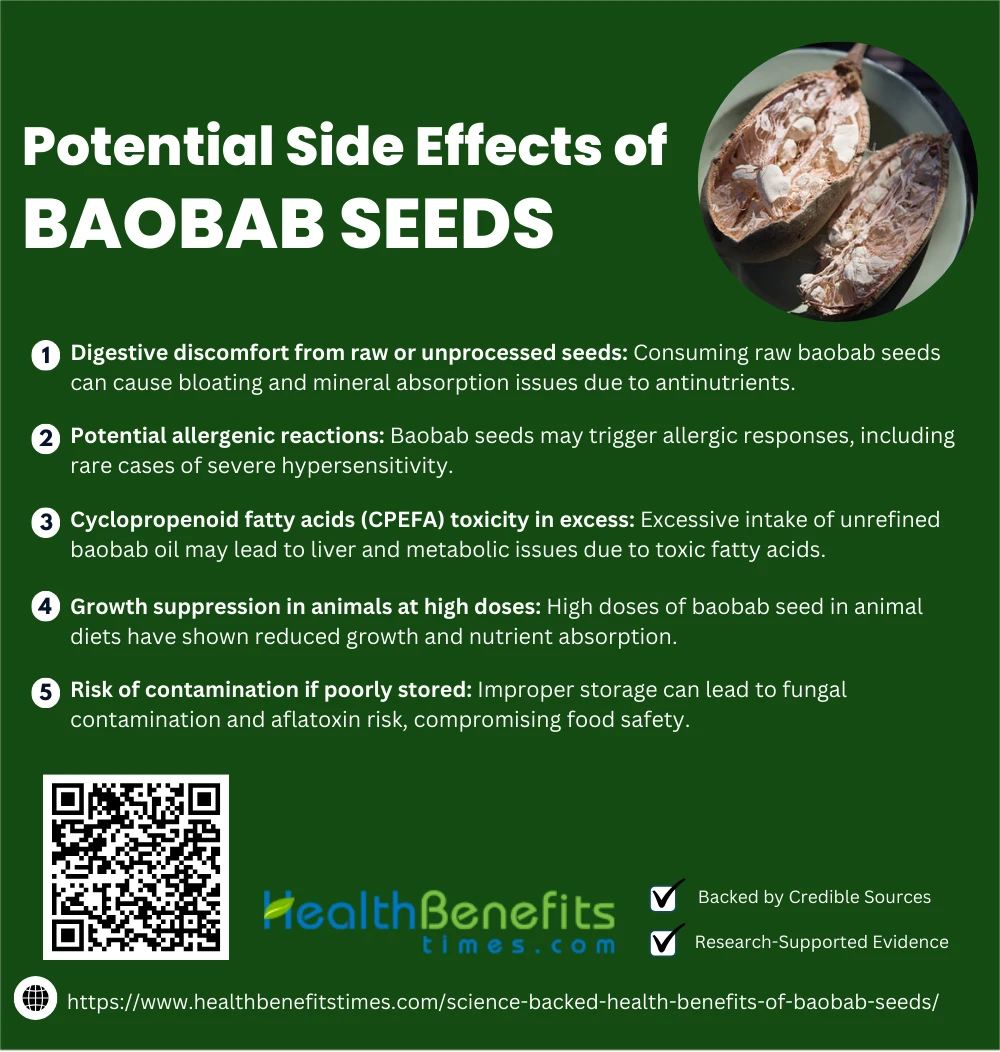 1. Digestive discomfort from raw or unprocessed seeds
1. Digestive discomfort from raw or unprocessed seeds
Raw baobab seeds may cause digestive issues due to antinutrients like phytates and oxalates that interfere with mineral absorption and gut function. (11) These compounds can lead to bloating or discomfort if consumed in large amounts. (5) Proper processing significantly reduces these effects. (36)
2. Potential allergenic reactions
Although generally well-tolerated, baobab seeds may trigger hypersensitivity or allergic reactions, particularly in individuals with seed allergies. A rare case of anaphylaxis was documented in adults upon first exposure. Baobab’s seed proteins may act as hidden allergens. (44) Caution is advised when introducing it into new diets.
3. Cyclopropenoid fatty acids (CPEFA) toxicity in excess
Baobab seed oil contains cyclopropenoid fatty acids (CPEFAs), compounds linked to hepatotoxicity and disrupted lipid metabolism when consumed in large quantities. Prolonged intake may lead to growth impairment or reproductive dysfunction in animals. (5) These effects were notably observed in animal studies with unrefined baobab oil. (45) Heat treatment and refining reduce this risk. (46)
4. Growth suppression in animals at high doses
High doses of baobab seed meal in animal diets may impair growth performance and nutrient assimilation. In goats, fermented baobab seed reduced feed efficiency and blood profile values. (47) Similar weight suppression was noted in diabetic rats and during long-term toxicity testing.
5. Risk of contamination if poorly stored
Improper storage of baobab seeds can lead to fungal growth, especially Aspergillus, increasing the risk of aflatoxin contamination. A Kenyan study showed microbial loads exceeding safety thresholds in inadequately stored baobab products. (42) Dry environments are essential for safe preservation. (13) HACCP protocols enhance microbial safety during packaging. (43)
Conclusion
In conclusion, baobab seeds offer a remarkable array of science-backed health benefits. Packed with antioxidants, vitamins, and dietary fiber, they support immune function, digestive health, and skin vitality. The seeds’ high vitamin C content enhances immunity and skin health, while their rich fiber profile promotes healthy digestion. Additionally, their potential to manage blood sugar levels and reduce inflammation makes them an excellent addition to a balanced diet. By incorporating baobab seeds into your routine, you can tap into nature’s nutritional powerhouse, enhancing overall well-being with a simple, natural supplement. However, it’s important to consume them responsibly.


